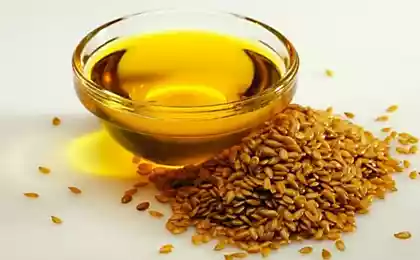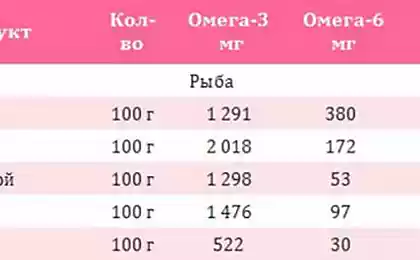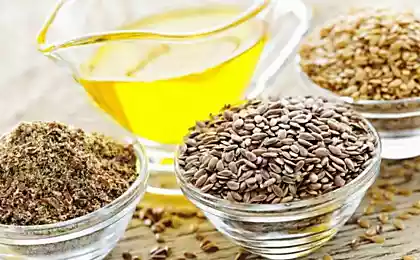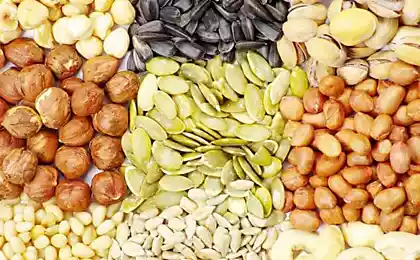523
Useful educational program on vegetable oils
In order to determine the most useful plant oils consider the composition and characteristics of the most common in stores edible oils, and also oils, which is often written on the packaging of the finished product.
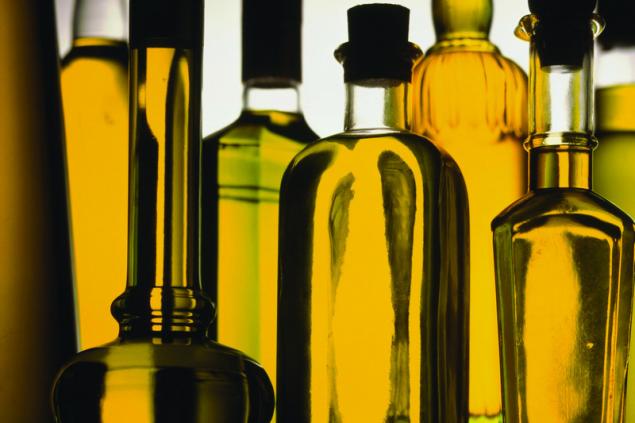
In the food without heating it is recommended to use cold pressed (pressed), unrefined or crude oil. For frying it is better to use a refined oil of high purity.Peanutpeanut Seeds contain up to 40 – 50 % oil, taste like almond. In food production this oil is used mainly in the form of additives to margarine and butter, chocolate, confectionery pastes and other products, in particular dough products. 100 kg of raw materials get up to 50 kg of fatty oil. Peanut oil obtained by direct pressing, contains large amounts of vitamins and minerals.
Grape (grape seed oil or grape oil)Is a vegetable oil obtained by hot extraction of seeds of grapes. Cold-pressed method in practice is rarely used due to the relatively small yield of the final product. Grapeseed oil has a light wine taste. A specific flavor of this oil makes it especially popular in cooking, to give a certain piquancy to the finished dish.
Nutritional value is not inferior to sunflower oil. The content of unsaturated fatty acids omega-6 and omega-9 high: linoleic and 72% oleic – 16%. The content of essential omega-3 is very small, less than 1%. Also contains a small amount of vitamin E.
Useful properties of grape seed oil: is a cytoprotector, an antioxidant and regenerator. Grape seed oil starts to smoke at a high temperature (about 216°C), so it can be used in high temperature methods of food processing, for example, for deep-frying.
MustardOil produced from mustard seed, is a valuable vegetable oils with a high content of biologically active substances. This oil contains large amounts of polyunsaturated fatty acids, up to 96%(!), of which are essential omega-3 and 14% (linolenic) and omega-6 – 32% (linoleic). Omega-9 – 45% (oleic acid). Such indicators content superior to many oils, including sunflower.
It should be noted that the essential acids omega-6 are found in virtually every unrefined oil. But the essential omega-3 are extremely rare: in flax, mustard, camelina oil and fish oil.
Mustard oil has a pleasant light taste. Not bitter, as many people think.
Despite the high biological value, mustard oil on the Russian table is a rather exotic product. Nutritionists call this "Imperial delicacy" (mustard oil preferred Nicholas II) a ready-made medicine. However, the effect on the body this oil is controversial.
Despite the higher content of essential polyunsaturated acids in unrefined mustard oil is present erucic acid (acid groups omega-9), which, according to currently not utilized enzyme system of mammals, has a tendency to accumulate in various tissues, can cause disorders of cardiovascular activities and some other disorders. Erucic acid is also found in rapeseed and rapeseed oils. For removal of oil refining. Selling crude rapeseed oils banned in the EU and several other countries.
Cornis produced from corn germ. The content of valuable biologically active substances of this oil to close to sunflower. As in the sunflower, this oil contains little, only 1%, polyunsaturated fatty acids omega-3. High content of omega-6 and omega-9 (linoleic 40 – 56%, oleic 40 – 49%). It also has a high content of antioxidant α-tocopherol (vitamin E).
Useful properties of corn oil similar to the useful properties of sunflower.
High temperature dymlenija of this oil makes it suitable for frying, including deep-frying. Oil is used in baking industry for making salads, mayonnaise and margarine.
Linenfast drying oil from the seeds of the flax with one of the highest content of valuable polyunsaturated fatty acids omega-3 and omega-6 are not synthesized in the body. (Linoleic 15 – 30%, linolenic 44 – 61%) and omega-9 (oleic 13 – 29%). On the biological value of Flaxseed oil is the leading vegetable and related to dietary food. Contains large amounts of vitamins and minerals. Has a specific and unusual taste and aroma.
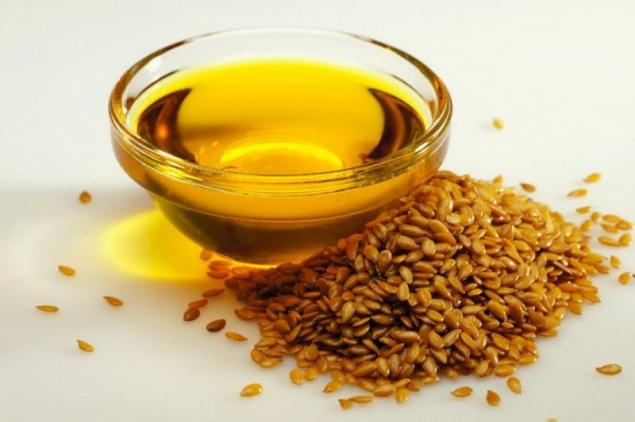
Linseed oil is recommended to add in pure form or in salads, vinaigrettes, cereals, sauces, sauerkraut. In cardiovascular diseases doctors advise to replace the sunflower oil flax. Lowers "bad cholesterol" that prevents the development of trileros, improves blood circulation, has cardioprotective-arrhythmic effect, improves tissue nutrition, reduces the intensity of inflammatory processes, is recommended in diseases of the liver and biliary tract, has a positive effect on hair and nails, as well as the endocrine system.
Get flax seed oil mainly cold extraction not refining. It is therefore right to pick this product in the store will not be difficult.
Flaxseed oil to go rancid quickly, it should not be subjected to heat treatment, and keep better in a cool dark place. Rancid oil cannot be upotreblyat in food because it produces toxic chemicals: epoxides, aldehydes and ketones.
Olive (olive oil, wood oil)the Oil from the olive fruit with a high content of monounsaturated fatty acids, particularly, esters of oleic acid (omega-9). Is a valuable dietary and digestible product contains a complex of vitamins, minerals, and essential fatty acids omega-6. Possesses excellent qualities and is widely used in cooking.
Olive oil is recommended to add in pure form or in salads, soups, main dishes, eat on an empty stomach. Lowers "bad cholesterol", preventing myocardial infarction, ischemic heart disease and other cardiovascular diseases. Helps to maintain the level of glucose in the blood, strengthens the immune system, reduces the intensity of inflammatory processes and risk of cancer, stimulates the growth of bone tissue, useful in disorders of digestion, diseases of the liver and biliary tract, is an antioxidant, slows the aging process.
The best may be considered unfiltered extra virgin olive oil Extra Virgin Unfiltered Olive Oil, or filtered extra virgin Olio d'oliva extravergine l / extra virgin olive oil / extra virgen. Even more valuable is the "drip" olive oil, cold pressed, first cold press.
The following oils are considered less valuable and are commercial:
Palm (Palm kernel oil)isa Vegetable oil obtained from the fleshy part of the fruit of the oil palm. Oil from the seeds of palm trees called palm kernel oil. On the shelves is not found in its pure form is almost never used, but included in many prepared foods. Due to the high content of monounsaturated fatty acids, particularly oleic, palm oil has high oxidative stability, therefore, can prolong the shelf life of products. Basically, palm oil is subjected to modification: the resulting modification gidrogenizirovannye vegetable fat used in food production for the manufacture of a wide range of products.
Sunfloweris the Most popular and widespread in Russia the oil extracted from sunflower seeds. This oil contains only 1% omega-3 polyunsaturated fatty acids. But very high content of omega-6 and omega-9 (linoleic 46 – 62%, oleic acid 24 – 40%). Compared to other oilseed plants — the content of antioxidant-tocopherol (vitamin E) in sunflower unrefined oil is one of the most high: from 46 to 60 mg per 100 g of oil.
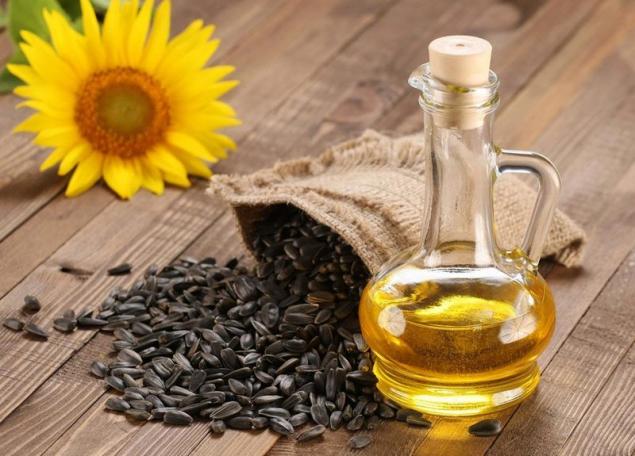
Unrefined sunflower oil obtained by direct pressing, is a powerful antioxidant, slows the aging process in the body, lowers cholesterol, participates in protein synthesis, strengthens the body's defenses, has cardioprotective and antiarrhythmic effect, reduces inflammation in the body, improves tissue nutrition, has a positive effect on digestion.
Insights? Olive oil is marketed in the media as the "most useful", but that's not entirely true. Comparing the compositions of different oils, we get the conclusion that to obtain all the necessary components the body is better to combine different malayli to alternate their use. For example, olive oil contains a small amount of Tocopherols (vitamin E), while in sunflower this figure is much higher. At the same time, to give your body essential and reconstructedin acids omega-3, you need to use flax oil, you can try refined mustard is also recommended fatty marine fish or fish oil. The set of essential omega-6 will fill almost any oil: sunflower, grapeseed, Flaxseed, olive, corn... of Valuable biologically active substances: vitamins and minerals found in any unrefined or raw oil, obtained by direct extraction.
Friends, and what kind of oil do you prefer? Based on what preferences? Do you follow strict rules with read the labels or do not bother about it?
P. S. And remember, just changing your mind — together we change the world! ©
Source: hrumburum.ru/post/40

In the food without heating it is recommended to use cold pressed (pressed), unrefined or crude oil. For frying it is better to use a refined oil of high purity.Peanutpeanut Seeds contain up to 40 – 50 % oil, taste like almond. In food production this oil is used mainly in the form of additives to margarine and butter, chocolate, confectionery pastes and other products, in particular dough products. 100 kg of raw materials get up to 50 kg of fatty oil. Peanut oil obtained by direct pressing, contains large amounts of vitamins and minerals.
Grape (grape seed oil or grape oil)Is a vegetable oil obtained by hot extraction of seeds of grapes. Cold-pressed method in practice is rarely used due to the relatively small yield of the final product. Grapeseed oil has a light wine taste. A specific flavor of this oil makes it especially popular in cooking, to give a certain piquancy to the finished dish.
Nutritional value is not inferior to sunflower oil. The content of unsaturated fatty acids omega-6 and omega-9 high: linoleic and 72% oleic – 16%. The content of essential omega-3 is very small, less than 1%. Also contains a small amount of vitamin E.
Useful properties of grape seed oil: is a cytoprotector, an antioxidant and regenerator. Grape seed oil starts to smoke at a high temperature (about 216°C), so it can be used in high temperature methods of food processing, for example, for deep-frying.
MustardOil produced from mustard seed, is a valuable vegetable oils with a high content of biologically active substances. This oil contains large amounts of polyunsaturated fatty acids, up to 96%(!), of which are essential omega-3 and 14% (linolenic) and omega-6 – 32% (linoleic). Omega-9 – 45% (oleic acid). Such indicators content superior to many oils, including sunflower.
It should be noted that the essential acids omega-6 are found in virtually every unrefined oil. But the essential omega-3 are extremely rare: in flax, mustard, camelina oil and fish oil.
Mustard oil has a pleasant light taste. Not bitter, as many people think.
Despite the high biological value, mustard oil on the Russian table is a rather exotic product. Nutritionists call this "Imperial delicacy" (mustard oil preferred Nicholas II) a ready-made medicine. However, the effect on the body this oil is controversial.
Despite the higher content of essential polyunsaturated acids in unrefined mustard oil is present erucic acid (acid groups omega-9), which, according to currently not utilized enzyme system of mammals, has a tendency to accumulate in various tissues, can cause disorders of cardiovascular activities and some other disorders. Erucic acid is also found in rapeseed and rapeseed oils. For removal of oil refining. Selling crude rapeseed oils banned in the EU and several other countries.
Cornis produced from corn germ. The content of valuable biologically active substances of this oil to close to sunflower. As in the sunflower, this oil contains little, only 1%, polyunsaturated fatty acids omega-3. High content of omega-6 and omega-9 (linoleic 40 – 56%, oleic 40 – 49%). It also has a high content of antioxidant α-tocopherol (vitamin E).
Useful properties of corn oil similar to the useful properties of sunflower.
High temperature dymlenija of this oil makes it suitable for frying, including deep-frying. Oil is used in baking industry for making salads, mayonnaise and margarine.
Linenfast drying oil from the seeds of the flax with one of the highest content of valuable polyunsaturated fatty acids omega-3 and omega-6 are not synthesized in the body. (Linoleic 15 – 30%, linolenic 44 – 61%) and omega-9 (oleic 13 – 29%). On the biological value of Flaxseed oil is the leading vegetable and related to dietary food. Contains large amounts of vitamins and minerals. Has a specific and unusual taste and aroma.

Linseed oil is recommended to add in pure form or in salads, vinaigrettes, cereals, sauces, sauerkraut. In cardiovascular diseases doctors advise to replace the sunflower oil flax. Lowers "bad cholesterol" that prevents the development of trileros, improves blood circulation, has cardioprotective-arrhythmic effect, improves tissue nutrition, reduces the intensity of inflammatory processes, is recommended in diseases of the liver and biliary tract, has a positive effect on hair and nails, as well as the endocrine system.
Get flax seed oil mainly cold extraction not refining. It is therefore right to pick this product in the store will not be difficult.
Flaxseed oil to go rancid quickly, it should not be subjected to heat treatment, and keep better in a cool dark place. Rancid oil cannot be upotreblyat in food because it produces toxic chemicals: epoxides, aldehydes and ketones.
Olive (olive oil, wood oil)the Oil from the olive fruit with a high content of monounsaturated fatty acids, particularly, esters of oleic acid (omega-9). Is a valuable dietary and digestible product contains a complex of vitamins, minerals, and essential fatty acids omega-6. Possesses excellent qualities and is widely used in cooking.
Olive oil is recommended to add in pure form or in salads, soups, main dishes, eat on an empty stomach. Lowers "bad cholesterol", preventing myocardial infarction, ischemic heart disease and other cardiovascular diseases. Helps to maintain the level of glucose in the blood, strengthens the immune system, reduces the intensity of inflammatory processes and risk of cancer, stimulates the growth of bone tissue, useful in disorders of digestion, diseases of the liver and biliary tract, is an antioxidant, slows the aging process.
The best may be considered unfiltered extra virgin olive oil Extra Virgin Unfiltered Olive Oil, or filtered extra virgin Olio d'oliva extravergine l / extra virgin olive oil / extra virgen. Even more valuable is the "drip" olive oil, cold pressed, first cold press.
The following oils are considered less valuable and are commercial:
- Refined — refined.
- Pomace olive oil — pomace, that is obtained by extraction using solvents.
- Pure olive oil or Olive oil — a mixture of natural and refined oils.
Palm (Palm kernel oil)isa Vegetable oil obtained from the fleshy part of the fruit of the oil palm. Oil from the seeds of palm trees called palm kernel oil. On the shelves is not found in its pure form is almost never used, but included in many prepared foods. Due to the high content of monounsaturated fatty acids, particularly oleic, palm oil has high oxidative stability, therefore, can prolong the shelf life of products. Basically, palm oil is subjected to modification: the resulting modification gidrogenizirovannye vegetable fat used in food production for the manufacture of a wide range of products.
Sunfloweris the Most popular and widespread in Russia the oil extracted from sunflower seeds. This oil contains only 1% omega-3 polyunsaturated fatty acids. But very high content of omega-6 and omega-9 (linoleic 46 – 62%, oleic acid 24 – 40%). Compared to other oilseed plants — the content of antioxidant-tocopherol (vitamin E) in sunflower unrefined oil is one of the most high: from 46 to 60 mg per 100 g of oil.

Unrefined sunflower oil obtained by direct pressing, is a powerful antioxidant, slows the aging process in the body, lowers cholesterol, participates in protein synthesis, strengthens the body's defenses, has cardioprotective and antiarrhythmic effect, reduces inflammation in the body, improves tissue nutrition, has a positive effect on digestion.
Insights? Olive oil is marketed in the media as the "most useful", but that's not entirely true. Comparing the compositions of different oils, we get the conclusion that to obtain all the necessary components the body is better to combine different malayli to alternate their use. For example, olive oil contains a small amount of Tocopherols (vitamin E), while in sunflower this figure is much higher. At the same time, to give your body essential and reconstructedin acids omega-3, you need to use flax oil, you can try refined mustard is also recommended fatty marine fish or fish oil. The set of essential omega-6 will fill almost any oil: sunflower, grapeseed, Flaxseed, olive, corn... of Valuable biologically active substances: vitamins and minerals found in any unrefined or raw oil, obtained by direct extraction.
Friends, and what kind of oil do you prefer? Based on what preferences? Do you follow strict rules with read the labels or do not bother about it?
P. S. And remember, just changing your mind — together we change the world! ©
Source: hrumburum.ru/post/40

